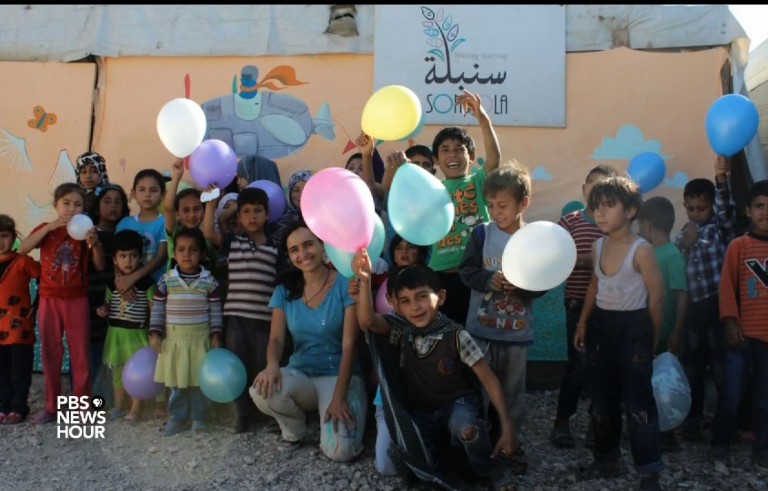HARI SREENIVASAN: Fighting in Syria continues into its fifth year. As the death toll grows and cities are destroyed, Syrian artists, many of them forced to flee their country, have sought ways to respond.
In recent months, we have profiled a number of these artists in our online Art Beat series Syrian Voices.
Jeffrey Brown has our look.
JEFFREY BROWN: A horror story told in one minute, that's the idea behind "Fade to Black," a short film by Amer Albarzawi, who shows us what's happened in Syria through the changing image of Farah Brisly, an actress from Damascus who now lives in Istanbul.
It's just one of the ways Syrian artists have responded to the destruction in their country. In a refugee camp in Lebanon, Farah's sister, Diala, has found another, working with Syrian children to design and painting murals with them to bring some color and joy to their lives.
Diala spoke to us by Skype from her home in Beirut.

DIALA BRISLY, Lebanon: Most of them, they skip school for two or three years. And they had to work in the farms to help their families. So, they have really very, very serious life that doesn't belong to a childhood, you know?
JEFFREY BROWN: The work on the murals, she says, begins with a brainstorming session as she asks them to imagine what seems impossible, like flying.
DIALA BRISLY: I tell them, like, you can use your imagination. It isn't supposed to be realistic. You can imagine anything.
Some of them, they think of butterflies, of birds, of air balloons, things like this. So, after that, I take this illustration and I get inspired by it, and I start designing the mural. And the day after, they come to help me in filling the colors in these murals.
JEFFREY BROWN: Another artist, a very different kind of imagery.
Waseem Al-Marzouki documents the history of the Syrian conflict through intricate, large-scale paintings and films that depict military and industrial images and symbols. He grew up near Raqqa, now the stronghold of the Islamic State, and now lives and works in Los Angeles. He told us the war had left him unable to work for a two-year period.
WASEEM AL-MARZOUKI, Artist: I was very shocked from what I see and what we have experienced, killing, displacement, torture, all these things happening to us. And, yes, so, after two years, I start working again, but I realize that what I'm doing is totally different than what I have done before. It's more related to what we are facing.
JEFFREY BROWN: Another voice, that of poetry, which has always had an honored place in Arabic culture.
Ghada Alatrash is a Syrian writer and translator now earning a doctorate at the University of Calgary in Canada.
GHADA ALATRASH, Writer/Translator: Syrian poetry today is an outcry. It is a plea to humanity. It embodies that human tragedy, the raw pain, the loss and the defeat.
JEFFREY BROWN: Alatrash is from Sweida, in the south of Syria, and has translated the work of Najat Abdul Samad, a friend who remains in their shared hometown. She read us the beginning of the poem "When I Am Overcome With Weakness."
GHADA ALATRASH: "When I am overcome with weakness, I bandage my heart with a Syrian woman's patience in adversity. I bandage it with December's frozen tree roots, trees that have sworn to blossom in March or April."
JEFFREY BROWN: And then there is this, a documentary titled "The Cow Farm," about a farmer on the outskirts of Salamiyah.
Filmmaker Ali Sheikh Khudr told us that, when the revolution began, many rushed to capture protests and the political upheaval. He decided to tell a different kind of story, one about Hassan, his own cousin, who supported the regime.
Khoo'-dur, a strong opponent, said he was after complexities, seeking to understand why people like Hassan sided with the government.
ALI SHEIKH KHUDR, Filmmaker: There's a lot of people just — they just didn't want to lose the things that they have. They didn't want to lose their future, they didn't want to lose their lives, they didn't want to lose in the country itself. They were very afraid. And they stood on one side against the other. So, you have — on both sides, you have people who are afraid, you know?
JEFFREY BROWN: Khudr's cousin Hassan died in 2013 fighting for the government. Khudr himself moved to Berlin.
He says that, above all, he feels a responsibility to share the stories of Syrians whose lives have changed forever.
ALI SHEIKH KHUDR: The first responsibility was for me that there should be a film, a documentary film from Syria telling something different, a new perspective, you know?
And there was also this second level of responsibility that I should take out this story. People who are dying in Syria are not numbers. They are human beings and they have lives, they have memories, they have dreams, and that was lost.
JEFFREY BROWN: Khudr and other artists we talked to are determined not to let these people's stories fade to black.
For the "PBS NewsHour," I'm Jeffrey Brown.
HARI SREENIVASAN: You can find much more on these and other artists in our Syrian Voices series on Art Beat at PBS.org/NewsHour.













